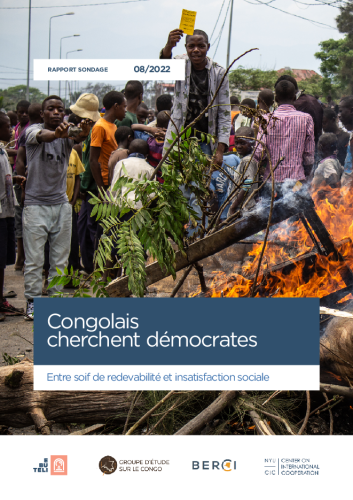Three and a half years after Felix Tshisekedi became president of the Democratic Republic of Congo (DRC), confidence in the DRC’s government and institutions remains low. Meanwhile, the security situation in the east of the country also continues to deteriorate, particularly with the resurgence of the March 23 Movement (M23).

In this new survey report, Congolese Seek Democratic Politicians: Between a Thirst for Accountability and Social Dissatisfaction, the Congo Research Group (CRG) and Ebuteli, its research partner in the DRC, with the Bureau d’études, de recherche et de consulting international (Berci), note a persistent distrust of institutions and a decried security policy.
Conducted between April and June 2022, the survey shows that, despite controversial election cycles, the Congolese remain committed to democracy. Seventy-seven percent of respondents believe this is the best form of government.
However, this confidence in democracy is accompanied by a distrust of the country’s institutions and their leaders. Only 17 percent of Congolese surveyed “strongly” support the way the president of the republic works. Félix Tshisekedi even received his worst score in terms of unfavorable opinions (51%) since 2019. And there is a similar lack of confidence in the central government, provincial authorities, and even the institutions involved in managing the electoral process.
“Our survey shows that citizens are not satisfied with the work done by the institutions at both the provincial and national levels. They have not done enough to improve social conditions. And the majority of respondents think that President Tshisekedi will not be able to fulfill his promises by 2023,” says Ithiel Batumike, a researcher in Ebuteli.
After more than three years in power, the Congolese do not seem to be convinced of the security policy in the country either. For example, only 22 percent of those polled believe that the security of people and their property has improved over the past three years. A large majority of Congolese surveyed also point to interference by the Rwandan government (72%) as the most important cause of the ongoing conflict in eastern DRC, followed by interference by Western countries (71.5%), and corruption in Congolese institutions (71%).
“Our survey shows that the Congolese are exasperated with the deteriorating security situation in the country. The policies implemented so far by the government of Felix Tshisekedi are seen as ineffective. But the discrediting of these issues also affects UN MONUSCO, the international community and, of course, neighboring countries,” says Pierre Boisselet, coordinator of research on violence at Ebuteli.
Finally, this study confirms the failure of the policy of fighting corruption. More than 67 percent of respondents believe that the government has not been effective in this area. The Congolese National Police (PNC) topped the list of highly corrupt institutions, followed by the courts (45.7%) and parliament (45.6%).


